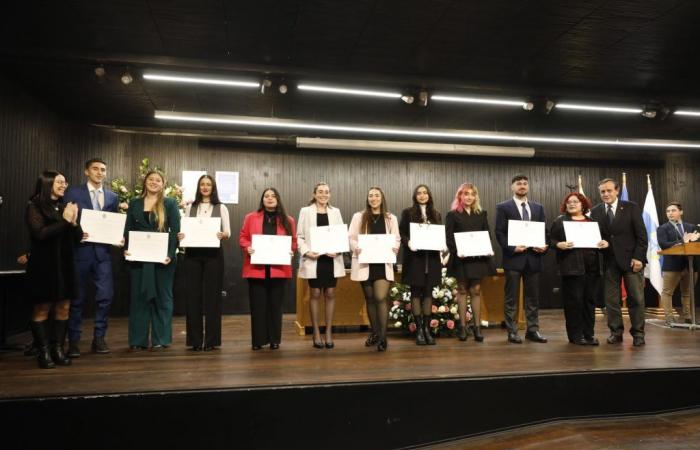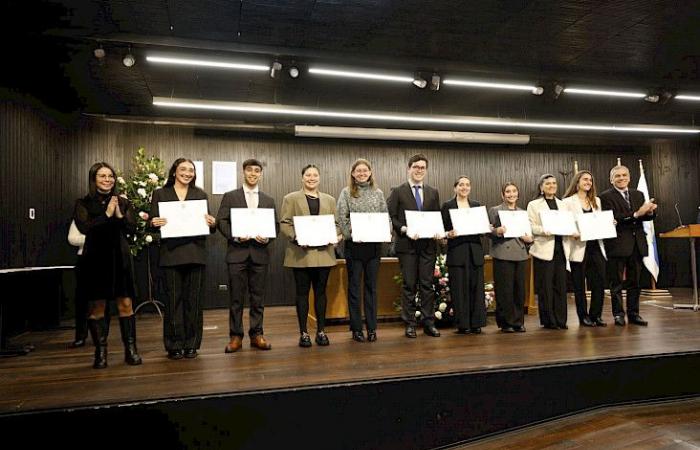In the auditorium of the Aulas Las Pataguas Building on the San Joaquín Campus, the bachelor’s degree ceremony for the first generation of students of the UC School of Veterinary Medicine was held. It was a significant and emotional meeting that, despite the intense rain, brought together the rector Ignacio Sánchez, the deans of the three founding faculties of the school, authorities and academic staff of this unit and the fifth year students and their families.
Although this degree does not represent the completion of undergraduate studies, it is a milestone that reflects an important advance for these first 50 students and demonstrates the successful progress of UC’s commitment to opening a school that offers a unique curriculum in our country, based on the One Health perspective, and which has cutting-edge facilities, characteristics that place it at the level of international veterinary medicine schools.
“The more than 50 men and women who today receive their bachelor’s degree are in a high-level educational environment in terms of teaching and research” – rector Ignacio Sánchez
The rector Ignacio Sánchez addressed a few words to the students, thanking them for their trust and that of their families in this nascent project, as well as their commitment and participation in the various activities that are part of their university education. He highlighted the excellence of the school’s academic staff, its curriculum and infrastructure, and reiterated the efforts of UC and the school to continue growing, with a priority being the materialization of the future university hospital for small animals.
Likewise, after participating in the ACCESS 2024 Forum in Stockholm, the rector highlighted the notable presence of the UC School of Veterinary Medicine in this important global event. “The school has professors who are working on One Health with a view of sustainability and it gives a lot of pride and satisfaction to see that a new career within the university has teachers and researchers of international level. The more than 50 men and women who today receive their bachelor’s degree are in a high-level educational environment in terms of teaching and research.”
Emphasizing the distinctive seal of the school and the degree, the representative dean, Dr. Felipe Heusser, referred to the difficult two years of health crisis caused by the Covid-19 pandemic. “This crisis showed us that the health of people, animals and ecosystems are closely interrelated. It showed us that changes in these relationships can increase the risk of new human and animal diseases. And it showed us the importance of the One Health approach, promoted by WHO and other organizations, and which has been adopted by our School of Veterinary Medicine, its founding faculties and our university,” highlighted Dr. Heusser.
For her part, Dr. Andrea Moreno, director of the school, referred to the solid training and mission of future veterinary doctors. “You have marked the beginning of a tradition of excellence and commitment, which we hope will endure for generations to come. Throughout these years, they have faced academic challenges, have participated in laboratories, field and operational practices, and have acquired knowledge that prepares them to practice veterinary medicine, a dynamic profession that requires a constant evolution of knowledge; a noble and essential profession that plays a fundamental role in our society. As future veterinarians, you will not only be guardians of the health and well-being of animals, but you will also be protectors of public health, allies of farmers and defenders of the environment,” said Dr. Moreno.
“You have marked the beginning of a tradition of excellence and commitment, which we hope will last for generations to come” – Andrea Moreno, UC Veterinary Director
At the close of the meeting, representing this first generation, the student Camila Sauma addressed a few words in which she thanked the work of her teachers, who have motivated the students and shown a concern for them that goes beyond their work as teachers. , and highlighted the students’ commitment to this profession. “I am very proud of how far we have come as a first generation. A message that has been repeated to me many times during this semester is that we are the future veterinary doctors of our country; “We are the ones who will lay the foundation for the future of the next generations of veterinary doctors.”
According to the study program, in 2025 students must choose between a clinical internship in small animals (canines and felines) or in equines, which include clinical rotations in various specialties. Once this stage is completed, they will receive their veterinary medical degree, which will entitle them to work in various organizations, both public and private, as well as in technological research and development centers.
Also present at this event were the dean of the Faculty of Biological Sciences, Juan Correa; the dean of the Faculty of Agronomy and Natural Systems, María Angélica Fellenberg; the advisor of the UC Pastoral, Father Federico Ponzoni; and academics of this unit.







